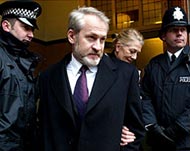Chechen rebel seeks peace talks
Chechen separatist leader Aslan Maskhadov has urged Moscow in a newspaper interview to open peace talks in response to his unilateral ceasefire.

Maskhadov, believed to be hiding out in Chechnya’s rugged southern mountains, said he had ordered a temporary truce last week in the war-torn republic until 22 February as a “goodwill gesture” towards Russian President Vladimir Putin.
“I hope for an adequate response. Because following my order for a temporary halt to all offensive operations, I ordered the formation of a delegation to hold contacts with the Russian side,” Maskhadov told the Russian daily Kommersant.
The guerrilla leader said he had chosen Umar Khambiyev, a former health minister in Maskhadov’s separatist administration who is now living in exile, to lead the peace effort in a bid to end the conflict now more than five years old.
Moral responsibility
 |
|
The Beslan school siege put the |
“If reason triumphs among our Kremlin opponents, we can end this war at the negotiating table. If not, then most likely blood will be spilled for a long time to come but we will not be morally responsible for the continuation of this madness,” Maskhadov said.
A senior presidential official said the Kremlin had not changed its policy of refusing to negotiate with Maskhadov.
“These are not people with whom we can hold talks. Maskhadov does not control the situation and, more importantly, he’s a terrorist. No country in the world is willing to deal with terrorists,” Kremlin spokesman Dmitry Peskov told AFP.
Deadly attacks
Maskhadov was elected president of Chechnya in 1997 in elections recognised by Moscow after it sued for peace to end a disastrous 1994-96 war, although Russia has since branded him a terrorist.
|
“We will not be morally responsible for the continuation of this madness” Chechen leader Aslan Maskhadov |
Once seen as a moderate figure, the former Soviet artillery officer’s influence has waned as radicals led by Shamil Basayev have staged a series of deadly attacks on Russians civilians.
More than five years after pouring in troops in October 1999 to restore control in Chechnya, Russia remains bogged down in a bloody guerrilla war despite setting up a pro-Moscow local administration.
After a spate of major clashes in three neighbouring republics in the past month, analysts suggested the Chechen rebels appeared to be responding to a secret peace initiative from the Kremlin, anxious about the conflict inflaming the entire Caucasus.
Offer dismissed
Pro-Moscow Chechen leaders, who control lucrative reconstruction funds allocated for the war-shattered republic, also dismissed the talks offer.
“Our stand is unwavering: there will be no political contacts with Maskhadov and his circle,” Chechen state council chief, Taus Dzhabrailov, told the Interfax news agency.
 |
|
Zakayev: The ceasefire shows |
By contrast, Maskhadov’s representative, Akhmed Zakayev, slammed the Kremlin for its stance.
The fact that Basayev was observing the ceasefire “shows that the Chechens are united in wanting peace and an end to this war”, he told AFP by telephone from London where he lives in exile.
“But Russia continues to insist on a military response,” Zakayev said.
Attacks halted
A source in the pro-Russian Chechen government said on Monday that there had been a virtual halt to Chechen rebel attacks since the ceasefire announced last Wednesday on the separatist website.
The official Russian toll from the war stands at more than 4700 soldiers though independent observers claim the true toll may be three times higher.
In a UK television interview broadcast last week sparking angry Russian protests, separatist hardliner Basayev warned of future attacks on Russian targets, such as the Beslan school siege in which more than 340 people – half of them children – died in the first week of September 2004.